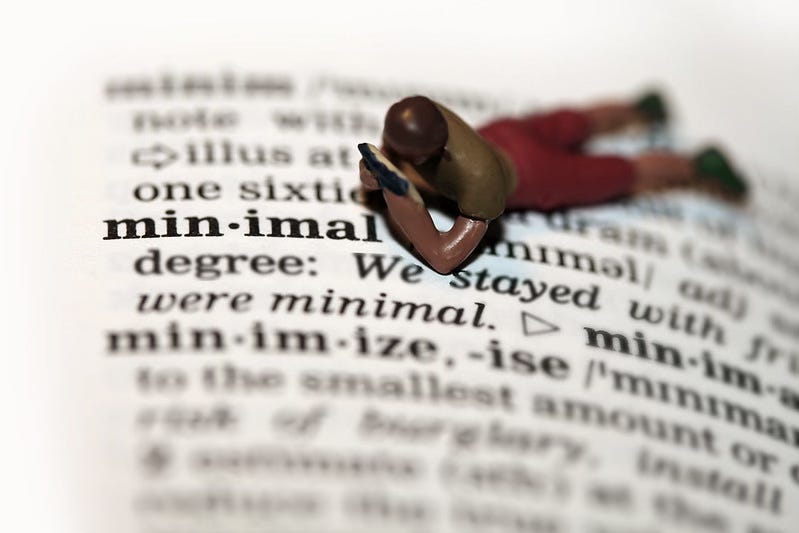Practice like a Stoic: 13, Start practicing minimalism
When you purposefully do with less, you shield yourself against the vagaries of fortune
[This series of posts is based on A Handbook for New Stoics—How to Thrive in a World out of Your Control, co-authored by yours truly and Greg Lopez. It is a collection of 52 exercises, which we propose reader try out one per week during a whole year, to actually live like a Stoic. In Europe/UK the book is published by Rider under the title Live Like A Stoic. Below is this week’s prompt and a brief explanation of the pertinent philosophical background. Check the book for details on how to practice the exercise, download the exercise forms from The Experiment’s website, and comment below on how things are going. Greg and/or I will try our best to help out! This week’s exercise is found at pp. 89-91 of the paperback edition.]
“How far happier is he who is indebted to no man for anything except for what he can deprive himself of with the greatest ease! Since we, however, have not such strength of mind as this, we ought at any rate to diminish the extent of our property, in order to be less exposed to the assaults of fortune. Those men whose bodies can be within the shelter of their armor are more fitted for war than those whose huge size everywhere extends beyond it, and exposes them to wounds; the best amount of property to have is that which yet is not far removed from it.” (Seneca, On Tranquillity of Mind, 8)
As we know by now, Stoicism hangs our happiness only on the things we control—that is, our judgments, values, and intentions. Our happiness does not include any “externals”—no objects, possessions, or money. Here Seneca is arguing that the more we own, materially or financially, the more we expose ourselves to the vagaries of Fortuna, the Roman goddess of luck. True, some people get pleasure from owning things, but the tradeoff is stress; we have to worry about maintaining our possessions, not breaking or losing them, and shielding them from the envy of other people who may steal them from us. All of this distracts us from the main goals: to work on our character in order to become better people, and to approximate ataraxia, or mental tranquility.
Seneca recognizes that to do away with possessions entirely—that is, to adopt the lifestyle of the ancient Cynic philosophers—is not for everyone. The Cynics (a word that means “dog like,” because their critics thought they lived like dogs rather than as human beings) sought an existence with no material possessions and no affective bonds. They lived in the streets, surviving on the charity of others, and did not marry or have children. The Cynics spent their whole lives practicing virtue and telling others how bad they were at it. Needless to say, they weren’t extremely popular at parties.
But that is not the Stoic way. For Stoics, you may recall, externals are preferred or dispreferred indifferents, meaning that you may or may not pursue them, so long as they don’t get in the way of working on your character. And that is exactly Seneca’s point: Too many possessions, and likely also too much money, do get in your way if your chief project is to become a better person. That said, Seneca didn’t exactly practice what he was preaching here, as he was one of the richest men in the empire, with excess properties and possessions. Accordingly, he was often criticized for it. Then again, he also never claimed to be a wise person; quite the opposite. He often wrote to his friend Lucilius about just how much he failed his own expectations:
“Pray, pray, do not commend me, do not say: ‘What a great man! He has learned to despise all things; condemning the madnesses of man’s life, he has made his escape!’ I have condemned nothing except myself. There is no reason why you should desire to come to me for the sake of making progress. You are mistaken if you think that you will get any assistance from this quarter; it is not a physician that dwells here, but a sick man.
As we learn from Seneca, if we are to make progress in improving our character, we should embrace minimalism.





It's like that great Libertarian philosopher Ron Swanson said, people who buy things are suckers